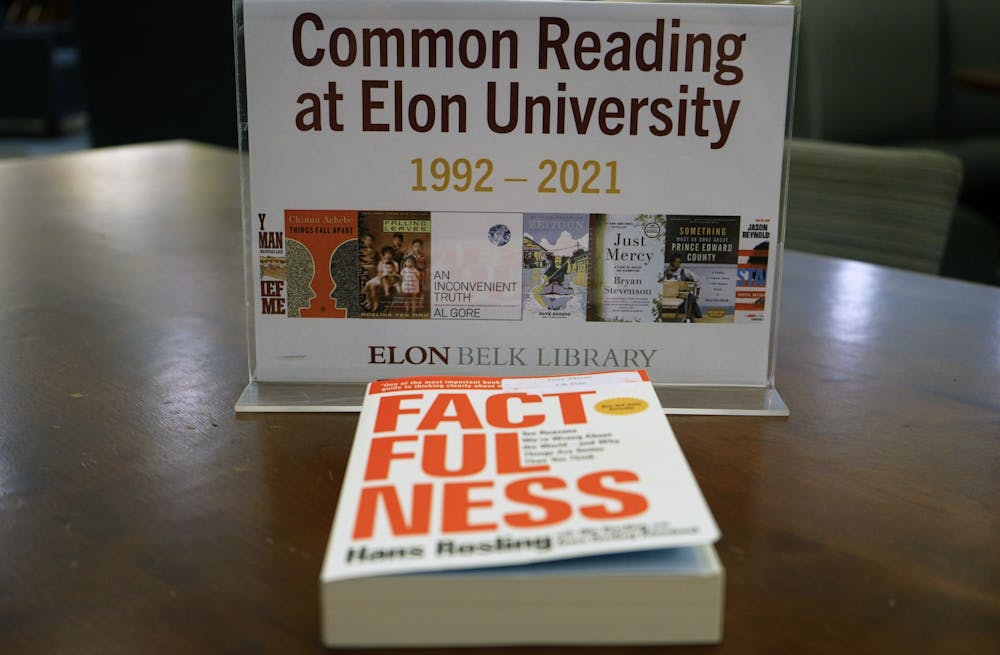Elon University’s common reading signifies incoming students’ first experience with the Elon Core Curriculum, as professors across disciplines incorporate the text into their freshman Global Experience classes.
This year’s common reading is “Factfulness: Ten Reasons We’re Wrong About the World – and Why Things Are Better Than You Think,” written by Swedish physician Hans Rosling. The book highlights common misconceptions about the world and uses data to prove the world is better off than one would expect, including being healthier, less dangerous and less poor.
The title alludes to the practice of only holding opinions which can be strongly supported by facts, something Elon philosophy professor Martin Fowler said was easily incorporated into his existing Global Experience class.
“Factfulness for philosophy teachers is like a red flag in front of a bull,” Fowler said.
The discipline of philosophy lends itself to most common reading, according to Fowler, and he said he has no issue relating most texts to his field. He said because “Factfulness” gets to the root of misconceptions of our worldview, he considers it to be a philosophical thesis applicable in each student’s life.
Sandy Marshall, professor of geography, said he hopes to make a similar impact on his Global class by using “Factfulness” to improve students’ critical thinking skills. But rather than approach Factfulness from a philosophical perspective, Marshall plans to use his academic background to emphasize the data Rosling presents and lead students to greater understanding of the world around them.
“A lot of what he writes with his object aligns with what I seek to do in my geography classrooms, which is to kind of meta their black and white binary thinking of developing undeveloped worlds and to get them to grow beyond some of the stereotypes they have of places around the world,” Marshall said.
In Marshall’s Global classroom, students will be able to spatialize the data displayed in “Factfulness” through both scavenger hunts and interactive mapping exercises. But beyond the lessons explicitly written in the book, Marshall said he hopes to teach “Factfulness in the wild.”
He said this will give students an opportunity to contextualize the information they consumed and apply it in a way that makes sense to their own life, serving the goal of both better understanding the text and giving it more relevancy.
Marshall will do this by having students bring in articles or other media they have consumed that relate to any of the habits listed in the book, as Rosling goes into detail about things such as fallacies in data and ways to correctly interpret media.
The messaging and data presented in “Factfulness” is of particular importance for incoming students as they transition into life at Elon, according to professor of art Shawn Tucker. Tucker said he thinks students going into college should have an accurate but uplifting understanding of the world, and he plans to emphasize Rosling’s argument that overly negative views of the world serve only as scare tactics.
“People sort of like to emphasize the negative sides of things so that people will be aware and do something,” Tucker said. “But in some ways, I think that that’s kind of a paternalistic, sort of an immature way of doing things. It’s as if people can’t just be told the truth and then be relied upon to make reasonable decisions.”
However, not every professor plans to teach “Factfulness” so rigidly. Bilal Ghandour, professor of psychology who has taught several Global Experience classes since 2017, said the common reading is not something he typically includes.
Ghandour said his class mainly consists of watching films that expand students’ worldviews, then fostering discussions, and while he might allude to the common reading, he generally keeps the structure of his class the same.
He said the goal of his class is similar to ideas presented in “Factfulness,” but he has a different way of presenting the information.
“One of the objectives of the common reading is to get out of your bubble,” Ghandour said. “See different opinions, be able to step out of your comfort zone, and appreciate perspectives that are different from your own. See what ways in which you can find yourself matching what you thought was different in other cultures.”
Across disciplines, professors said they are drawing upon the common reading’s potential to expand students’ worldviews and improve their critical thinking skills. But from there, Fowler said the burden to implement the practice of factfulness is placed on the students.
“The main challenge that global students will have in dealing with the common reading is coming to terms with the idea that they’re not just naive observers, that everything that hits their eyeballs is the truth,” Fowler said. “There are some obstacles or detours along the way to getting at what the facts are. Also, getting at the facts isn’t just overcoming bad instincts — no, it’s a kind of discipline.”


